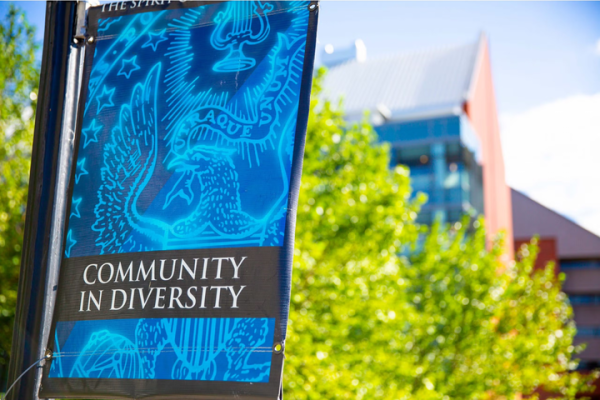The U.S. Department of Education gave educational institutions two weeks to end diversity initiatives or risk losing federal funding, potentially impacting student life and funding on Georgetown University’s campus.
In a Feb. 14 letter to all educational institutions, the department ordered schools to comply with the administration’s interpretations of federal law regarding race and end potentially “discriminatory” programming that involves race. Georgetown may risk its federal funding if the Department of Education finds it is noncompliant with the law.
In the letter, Craig Trainor, acting assistant secretary for civil rights in the Department of Education, said federal law prohibits educational institutions from using race in decisions related to any aspect of university administration and student life.
“The law is clear: treating students differently on the basis of race to achieve nebulous goals such as diversity, racial balancing, social justice or equity is illegal under controlling Supreme Court precedent,” Trainor wrote in the letter. “Federal law thus prohibits covered entities from using race in decisions pertaining to admissions, hiring, promotion, compensation, financial aid, scholarships, prizes, administrative support, discipline, housing, graduation ceremonies and all other aspects of student, academic and campus life.”

While the letter is not binding and does not create any new legal standards, similar letters have often indicated the direction of policy for institutions to follow.
At Georgetown, programming that may be affected by the letter could include the Office of Institutional Diversity, Equity & Affirmative Action (IDEAA), which promotes diversity initiatives through academic and employment measures; the Office of Student Equity and Inclusion (OSEI), which supports diversity, equity and inclusion (DEI) initiatives on campus; or the Center for Multicultural Equity and Access (CMEA), which supports students who have had historical barriers to education. Georgetown could also be penalized for supporting student racial affinity organizations on campus.
A university spokesperson did not respond to a request for comment regarding specific programming the university offers but said Georgetown is committed to supporting the diversity of students and staff on campus while remaining in federal compliance.
“We are committed to providing an academic and work environment where all members of our community can thrive, are treated fairly, welcomed and respected and do their best work,” the spokesperson wrote to The Hoya. “University staff are closely monitoring updates to federal policy. Georgetown complies with federal regulations.”
Taylor Lowe (SFS ’25), the president of the Black Student Alliance — a student group that connects and protects Black students on campus — said the Trump administration’s targeting of initiatives that support diversity and inclusion ultimately hurts minority students.
“As a President of an organization that would be a target for ‘anti-DEI’ and other such movements promoted by our current administration, I am fearful for the future of my organization,” Lowe wrote to The Hoya. “This would directly impact my club as well as many others on this campus, which do good work to ensure that our respective student populations are safe and catered to in a campus environment which does not automatically make them feel that way.”
Nitya Gupta (SFS ’27), the politics and advocacy co-chair of the Asian American Student Association (AASA), said the letter demonstrates how politicians fail to understand the experiences of minorities.
“Not just as a student club, but these attacks against education towards the Asian, Brown and Black experience in the U.S., in our classes and in our lives continue to perpetuate the erasure of our history,” Gupta told The Hoya. “I think that’s something that we are scared of, but we’re going to be working even harder to combat these problems through student life.”
Ethan Henshaw (CAS ’26), the president of the Georgetown University Student Association (GUSA), said student government is communicating with the university on the school’s response.
“We are only a student government and can only influence so much change, but we have been discussing the executive order and looking for ways in which GUSA can be helpful,” Henshaw wrote to The Hoya. “It is our hope that the university will not bend to these threats, but in the case they do, we are happy to use all of the resources available to us.”
Corey Madison (CAS ’27), the Georgetown chapter president of the National Association for the Advancement of Colored People (NAACP), a civil rights organization, said the decision presents an obstacle for all students to receive equal opportunities.
“This decision is unfortunately a microcosm for bigger changes and divides that are bound to come under the Trump administration,” Madison wrote to The Hoya. “It’s more important than ever for students, especially here at Georgetown, to resist the rollback of DEI programs and instead actively operate with diversity, equity and inclusion in their daily lives.”
Lowe said the letter comes at a time when the university has not provided navigation for students or student organizations who would be affected by the laws.
“While I am doing what I can to change that, and inspire my fellow Black students and allies to do what they can to combat this unprecedented era of social regression, there is only so much I can do,” Lowe wrote. “The Georgetown Administration must defy the students’ expectations and do more to protect its population.”
“If it does not, it will only confirm what many students of color know to be true; that Georgetown does NOT have our best interests at heart,” Lowe added.
Gupta said initiatives targeting racial diversity only make it more crucial for AASA and other affinity organizations to continue their work.
“AASA and students in general will just try to continue doing what we’ve been doing,” Gupta said. “I don’t think we should try to self-censor ourselves or stop what we’re doing because of fear of the government taking back our funding and our endowment. I think it’s actually more important than ever that we hold these events and create these spaces for people to find each other, talk about these issues and create solidarity between groups.”